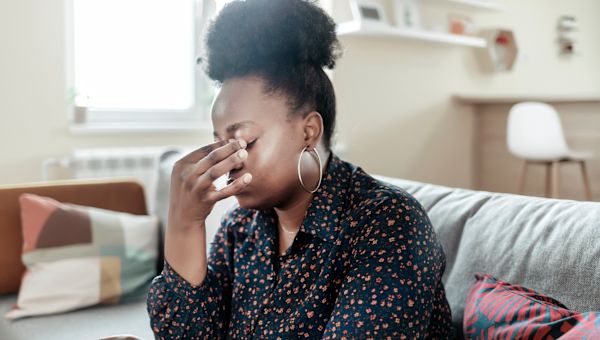7 questions to ask about major depression
Your healthcare provider’s answers can help you get the treatment you need.
Updated on January 5, 2026

If you've been diagnosed with major depression (also called clinical depression, major depressive disorder, or MDD) or think you could have it, you may have a lot of questions, like how it’s treated and what to expect from treatment. Understanding everything you can about major depression and talking openly with your healthcare provider (HCP) is the first step toward recovery. Start managing your depression symptoms by learning the answers to these seven important questions.

Do I have major depression?
Depression is marked by profound sadness and a lack of interest in life. If you have major depression, you'll have a persistent low mood that interferes with your ability to function. It may cause physical and emotional symptoms, and can last for weeks, months, or years.
Major depression symptoms last at least two weeks, says Rob Doyle, MD, clinical instructor of psychiatry at Harvard Medical School and staff member at Massachusetts General Hospital in Boston. You may feel hopeless, unable to sleep or eat, or have thoughts of self-harm. To diagnose and treat your depression, your HCP will ask questions about how it affects your life.

Why am I depressed?
The cause of depression is not completely understood, but onset may occur in a few different ways. For patients and loved ones, it can be especially frustrating when depression occurs for no apparent reason. "It might have to do with the way the brain is working or even a genetic factor," Doyle says. "It can happen at any time in life, but it's especially prevalent among women in their early 20s. Life is going well. They have a good job, a loving family, but something happens in the brain where they become depressed."

Is stress or illness causing my depression?
Sometimes depression is stress-induced or caused by a clear trigger. It may be a divorce, a death in the family or, for military personnel, time in combat. Even if the stressor is gone, depression may not lift. That's why it's important to seek treatment right away.
Physical illness can also cause depression. Most HCPs will do a physical exam. If your HCP thinks a thyroid problem, substance abuse, or other health condition is causing your depression, lab tests may be needed. Some medications can also cause these symptoms.

What treatments are available?
"Depression treatments can include talk therapy and medication, but the patient will want to voice his or her preferences," says Alan J. Gelenberg, MD, a psychiatrist in Seattle, Washington. "There is nothing less helpful than having a doctor get three minutes of history, then push a prescription across the desk and the patient leaves thinking, 'I’m not taking some mind-altering medicine.'"
Learn as much as you can about common medications and therapies, like cognitive behavioral therapy. Also check with your insurance company regarding what's covered. "This way you can tell your doctor if you need a generic medication or can only receive therapy at a certain behavioral health center," he adds

What about medication side effects?
Selective serotonin reuptake inhibitors (SSRIs) are the most common medications for major depression. "These are the first choice because they have more benign side effects," says William Marchand, MD, assistant professor of psychiatry at the University of Utah in Salt Lake City. Side effects include loss of interest in sex, difficulty achieving orgasm, anxiety, sleep problems, and loss of appetite.
Decisions about medication are based on your needs. If you have insomnia, your HCP may try a non-SSRI. If side effects don't go away, they may try another type of drug. SSRIs may not be safe if you're pregnant or trying to become pregnant, but untreated depression is also dangerous during and after pregnancy. Talk with your HCP about the options best for you.

What should I do (or not do) during treatment?
Your medications shouldn't be debilitating or make you feel sedated (if they do, tell your HCP), but adding alcohol to the mix can change things. Doyle advises patients with depression to avoid alcohol. "One drink may act like an antidepressant, but it's a slippery slope," he says. "One drink feels good, then you have another and another, and the alcohol becomes a depressant."
In contrast, exercise may have a good antidepressant effect, Marchand says. Meditation can ease anxiety and boost feelings of self-worth. Also, making an effort to participate in social activities with friends and family can decrease feelings of social isolation.

What can I expect at follow-up visits?
As you follow your treatment plan for major depression, see your HCP regularly. For help with key details and questions, bring a family member or close friend. Be ready to share how you're feeling and if your mood has lifted. Remember, it usually takes two to three weeks for an antidepressant to begin to work, and six to eight weeks for a full response.
Share changes in your everyday functions with your HCP, too. "Changes in sleep, your sex life, energy level, ability to concentrate, appetite, a rash, a fever, a change in urine color—these are all things to tell your doctor about," Gelenberg says.
If you’re being treated and start to think of hurting yourself, reach out for help right away. Call, text, or chat the Suicide & Crisis Lifeline at 988. Or, call 911 or go to the nearest emergency room.

MedlinePlus. Major Depression. April 19, 2025.
National Institute of Mental Health. Depression. 2024.
Anxiety and Depression Association of America. Depression. December 22, 2025.
American Psychiatric Association. What Is Depression. April 2024.
Mayo Clinic. Depression (Major Depressive Disorder). October 14, 2022.
Mayo Clinic Staff. Selective Serotonin Reuptake Inhibitors (SSRIs). September 11, 2024.
National Health Service. Antidepressants. June 12, 2025.
More On


video

article

slideshow


video


video
